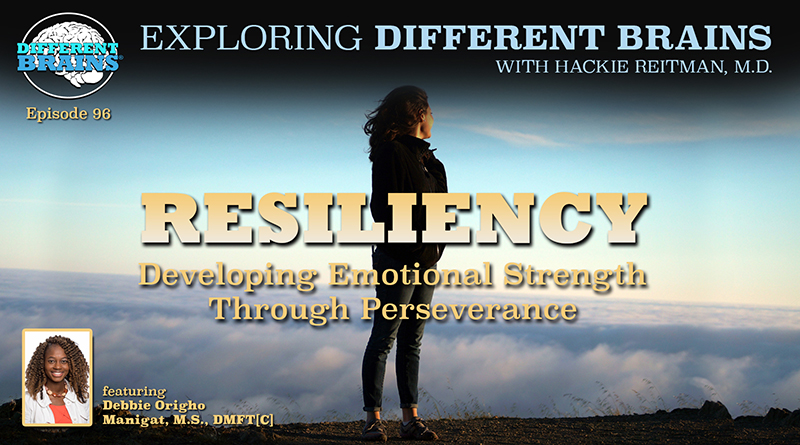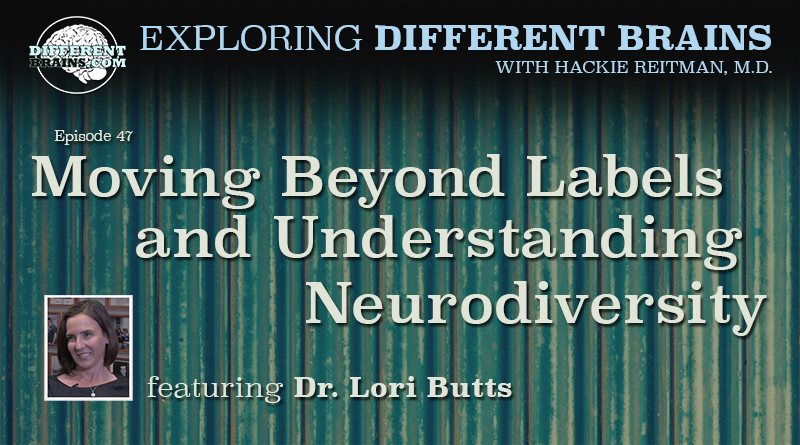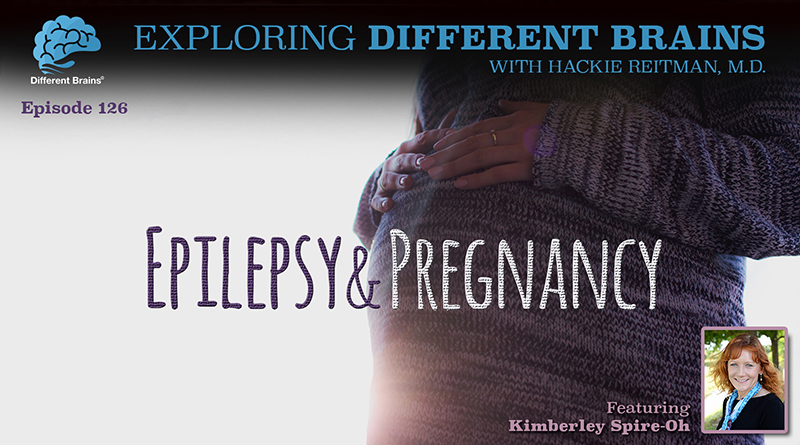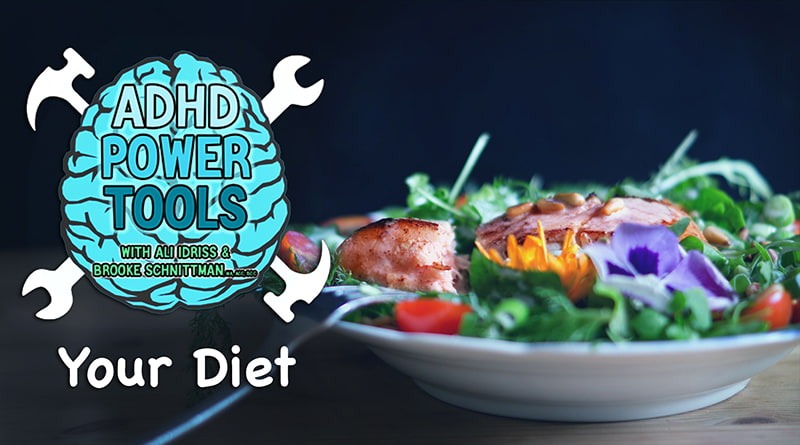
Resiliency: Developing Emotional Strength Through Perseverance, with Debbie Manigat | EDB 96
(18 mins) In this episode, Harold Reitman, M.D. welcomes back Debbie Origho Manigat, M.S., DMFT(c). Debbie is a Wellness Counselor, a Mental Health Advocate, and a Early Childhood Mental Health Consultant. She is also one of the board members of Different Brains Inc. Debbie discusses the importance of resiliency, common struggles related to postpartum depression, and the concept of mindfulness.
For more about Debbie, visit: DMEmpowers.com
.
55 Second Preview:
.
To listen or download the podcast version of this episode, see the embedded player below.
Or look for us on your favorite podcast provider:
iTunes | Stitcher | SoundCloud
[expand title=”View Full Transcript”]
HACKIE REITMAN, M.D. (HR): Welcome to another episode of Exploring Different Brains, and today we’re continuing our conversation with Debbie Manigat who’s a family therapist, a marriage counselor, a freedom coach and does so many thing. Debbie welcome again to exploring different brains.
DEBBIE ORIGHO MANIGAT, M.S., DMFT(c) (DM): Thank you for having me Hackie.
HR: So you’ve taken this back to the earliest prenatal infancy and you’re dealing with the entire spectrum of life itself. What made you start that early and tell us because until I met you really I was completely ignorant of starting when someone’s an infant, so enlighten us.
DM: Well zero to five is the foundational time of development. Working with children as well as their parents during those stages of development is critical to brain development, is critical to social-emotional development, it’s the period where you can really shape the brain and I always say behavior of the child as well. When you’re working with parents who may be first-time parents and maybe the mother is going through postpartum depression.
HR: Tell us some of the other organizations you’re involved with Debbie.
DM: Sure, so I also work with You Mom’s Incorporated, which is in Palm Beach County, and we focus on helping at-risk moms who are dealing with at-risk pregnancies or teen pregnancy prevention. I personally do a women’s or moms wellness group called moms like me and those are usually for moms who are struggling with postpartum depression but its open to any mom. Research actually shares that one out of eight or one out of ten moms actually experience postpartum depression and it’s not the baby blues, the baby blues is what mom’s may feel around two weeks after having a child. This is ongoing feelings of sadness, irritability, sleep or appetite disturbance, fatigue, loss of interest, problems, concentrating. So, through our Moms Like Me group we meet with moms once a week for six weeks and we practice mindfulness, we talk about what they’re feeling now that the baby is here, what they can do for their babies nutrition, for their nutrition, and then we also talk about practical lifestyle changes such as what are you going to do with your finances now that the baby is here. Will you return to work? Will you become a stay-at-home mom? We try to make sure they have some practical tools to really feel empowered and to help them through their depression into recovery.
HR: Another thing I’ve started to become educated on just recently, I was completely ignorant I’m just a little bit less ignorant, but was when I was speaking out in Aspen and there were discussions on mindfulness. Now to the uninitiated why don’t you explain to our audience about mindfulness.
DM: Mindfulness is all about being present. I remember when we first met and Hackie’s very much “okay gotta move it, gotta make moves, gotta win, gotta go,” and its like “ok Hackie, let me teach you how to slow down and we’re gonna be present in the moment and we’re gonna reflect before we make any decisions.” And I think you reflected for like a second. You were like “okay I’m done with this let’s move on.” But mindfulness is that opportunity to truly be present with no judgment to really be in the moment. How precious is that? We don’t have that today when we’re all so busy whether it’s being at work, on our computers, being at home, on Facebook, or being on Twitter trying to, you know, grow your social media on Instagram whatever it might be. Even just trying to check out the news or catch up on different TV shows, all of that pulls our attention constantly. Having the opportunity to practice mindfulness to learn mindfulness really helps you to be present, to take, I say, value of the moments that sometimes you might miss by just being on the go. Why don’t we all have that opportunity? To just take some time to slow down, embrace the silence, and without any judgment be in that moment to recognize what’s going on around us; to recognize right where we are. How much stress does I take off of you when you realize you know what I’m just going to be right here in this moment and breathe?
HR: It’s hypnotic, I feel better already! It’s unbelievable!
DM: You’d be surprised how many people don’t even realize like their breathing is off because they’re moving so fast, trying to get to the next thing, trying to beat the next person, and it’s like appreciate where you are, recognize who you are, and be mindful.
HR: It’s great, great advice. Let’s talk about something that we need more and more in today’s crazy world called resiliency.
DM: Yeah there are so many different TED talks on resiliency today. You’ll see people sharing their stories about you know what I went through and where I am today and resiliency is exactly that. Being able to overcome it all when all the odds are against you and you can stand and say I made it. Now I would say you never do that alone, I am a firm believer you never get anywhere on your own, it’s about those relationships and its better not to be alone when you’re trying to either make a difference, or trying to learn something new, or trying to master something. I wouldn’t be here today if it wasn’t for you Hackie and the Boys and Girls Club, and different mentoring programs. Because of those different leadership programs and the support that I received, I can say that I’ve had the opportunity to resolve different past circumstances when I was a child, to say that resiliency is truly my nature and way of life because I feel that when you are going through certain pain, certain trauma it can be really easy to give up because sometimes it hurts just that bad and you want to do anything to relieve the pain. But being able to walk through that, being able to climb up from all of your pain from your past, all of your present circumstances and understanding that those different challenges are making you better, are giving you invaluable life lessons that at the end of the day you can look back and say wow because of Hackie I made it. Because of the women of tomorrow, I am now a woman helping other at-risk girls. All of those different experiences play into my resiliency, and also for others think that being aware that you’re not in this world alone. There are organizations like the Boys and Girls Club, there are different mentoring groups, there are different professional groups that are there for you to reach out to for support, to educate yourself, and to get the resources that you need to help others and to ultimately help yourself along as well.
HR: You describe yourself also as a freedom coach. Tell us, what is a freedom coach?
DM: Well as a freedom coach I go to a lot of different churches to talk about spirituality and mental health because it’s not separate. But I found, within the faith community, there are a lot of people who may pray about what they are feeling and experiencing. They might go to their pastor when it’s not an either/or it’s both in your faith is important and your mental health is important and just as you would go to the doctor for a physical concern if you had a tooth ache, if you found out that you had cancer, you would immediately go and get the care that you need. It’s the same thing when you are experiencing depression, anxiety, you have to realize that your mental wellness is just as important and you don’t have to neglect your spirituality that’s a part of who you are. Having the opportunity to go to the White House that was one of the main topics. Being able to share with people that faith was the number one predictor in people not committing suicide, and having hope for tomorrow and having something to believe in versus those who did not. It’s transformative and you don’t have to feel that you have to…. It’s a lack of faith or in some religions that it’s a sin if you’re struggling with mental health.
Mental health is three things: biological, chemical, or circumstantial depending on what situation you’re going through that definitely can change your mood, can cause you to be depressed, can cause you to be stressed, can cause you to feel anxiety. And so getting the care that you need and recognizing that yes taking this to my church family, praying about it on my own that helps the process. But no one would tell you to sit in silence and in pain if you were going through any other type of disorder, especially a physical disorder. No one would say “you broke your leg, oh I’m so sorry, let’s take it to Jesus.” They would say “oh let’s get you to the hospital.” That’s how critical it is when you are having what I would say is a brain disorder. When your brain is hurting you need help, you don’t need to sit in silence. You can definitely hold on to your faith but that doesn’t negate you also getting the physical, mental, and emotional care that you may need. I also share a lot about recognizing that if the brain is an organ and it can hurt too. And when your brain is hurting, that affects your chemical balance. So when you’re experiencing really low moods, when you can’t get out of bed, when you feel stuck, when you are not able to experience life as normally, or as you used to then that’s actually an opportunity to seek out care from people, that when you think about faith that God created to help you. So you don’t have to be alone, you can receive the freedom from any type of strongholds or any type of mis-education to make sure that you’re living well and whole.
HR: Thank you for the kind words by the way. We touch just there and that very important “we are not alone,” and everybody I know needs a team. I’m finding, in our society, one of the more underrated things that both you and I have been very, very lucky with is having great mentoring Dr. David Siegel at Boston City Hospital, Dr. Leach, I’ve had great mentors in so many different fields and so many different ways in many different endeavors and very, very lucky for that. Speak a bit about mentoring in general and opportunities for people to mentor.
DM: Sure, presently I actually serve as a mentor with the Women of Tomorrow. It is a Scholarship Foundation and they provide scholarships to at-risk girls as well as disadvantaged girls in high school. What’s great about it is that professional women who are in executive leadership, volunteer once a month for one hour to meet with a group of girls. There are several high schools throughout Miami, Broward, Palm Beach they’ve expanded to Detroit, New York, and throughout this program the girls start in ninth grade and they go through 12th grade and once they’re in twelfth grade they are allowed to apply for a scholarship to college. Now when I was a part of this program the scholarships were very small two hundred and fifty dollars, five hundred dollars, the highest was $5,000 and I actually received a $5,000 scholarship from them to go to Howard University. Well, today, now that I’m a mentor, they give out full tuition scholarships $20,000, room and board, to make sure that young girls have the opportunity to get the education that they may have not been able to receive. And in my case I am the first person in my family to graduate from college with my undergraduate degree now I can actually soon say I will be the first doctor in my family and that is through the mentorship that I received. Professional women coming in and men sharing their stories, sharing their careers, sharing how they have been resilient, how they have overcome it really makes a difference, and it really changes the trajectory of a child’s life. So I’m a firm believer in mentoring, I am a mentor, and I think that if you have been blessed with an opportunity to go to school, to become a doctor, to become a lawyer, or to start your own business, what a joy it is to share that with our youth because they truly are our future.
HR: We’re talking here with Debbie Manigat, and I don’t know about you but I can tell you I’ve learned a tremendous amount during these interviews with Debbie. How can people learn more about you?
DM: Well, thank you so much for having me and I look forward to future opportunities to share my work and my passion. But, for people who are watching I’d love if you go to my website, DMempowers.com. That’s my name, Debbie Manigat, empowers, where you can get resources and information on what I do, have an opportunity to learn more about mindfulness. If you are a parent struggling with behavioral issues with your child, get an opportunity to learn more about what supports I can give you as a family therapist, and then finally if you’re an organization, a non-profit, or a corporate entity, being able to partner with you to share the importance of mental health so we can help reduce the stigma.
HR: Well Debbie, again, this is making a habit. We hope you’ll come back again, but it’s been a pleasure speaking with you again here on another episode of Exploring Different Brains. Thank you for all you do and thanks for being on the board of Different Brains.
DM: Thank you Hackie.
[/expand].
Different Brains® Inc. founder Harold “Hackie” Reitman, M.D. is an author, filmmaker, retired orthopedic surgeon, former professional heavyweight boxer, the past chairman and president (and current board member) of The Boys and Girls Clubs of Broward County, and a neurodiversity advocate. However, it was his role as a father that led to the creation of the DifferentBrains.org website.
Hackie’s daughter Rebecca grew up with epilepsy, 23 vascular brains tumors, and underwent 2 brain surgeries before the age of 5. Her struggles and recovery put him on the road to, through 26 professional heavyweight boxing matches, raising money for children’s charities (to which he donated every fight purse).
Rebecca eventually went on to graduate from Georgia Tech with a degree in Discrete Mathematics, and Dr. Reitman wrote and produced a film based on her experiences there (The Square Root of 2, starring Darby Stanchfield of ABC’s Scandal). After graduation, Rebecca received a diagnosis of Asperger’s syndrome. Hackie, shocked at his own ignorance of the topic despite being an M.D., embarked on years of research that culminated with his book Aspertools: The Practical Guide for Understanding and Embracing Asperger’s, Autism Spectrum Disorders, and Neurodiversity (released by HCI books, publishers of the Chicken Soup for the Soul series).
This experience revealed to Hackie the interconnectedness of the conditions that fall under the neurodiversity umbrella, while alerting him to the in-fighting and fractured relations that often plague the organizations tasked with serving the community. Convinced that overcoming these schisms could help all of society, Hackie forged the Different Brains philosophy of inclusive advocacy: “Supporting Neurodiversity – From Autism to Alzheimer’s and All Brains In Between”.
In the company’s initial years of operation, Hackie self-financed all of the content on DifferentBrains.org, all of which offered free to view to the public. Currently he is the host of our weekly interview show Exploring Different Brains, writes blogs for the site, and tours the country speaking at conferences, conventions and private functions, all with the goal of improving the lives of neurodiverse individuals and their families, and maximizing the potential of those with different brains. Separate from Different Brains, Hackie is the founder and CEO of PCE Media, a media production company focusing on reality based content. He recently co-executive produced the documentary “Foreman”, the definitive feature documentary on legendary boxer and pitchman George Foreman.




